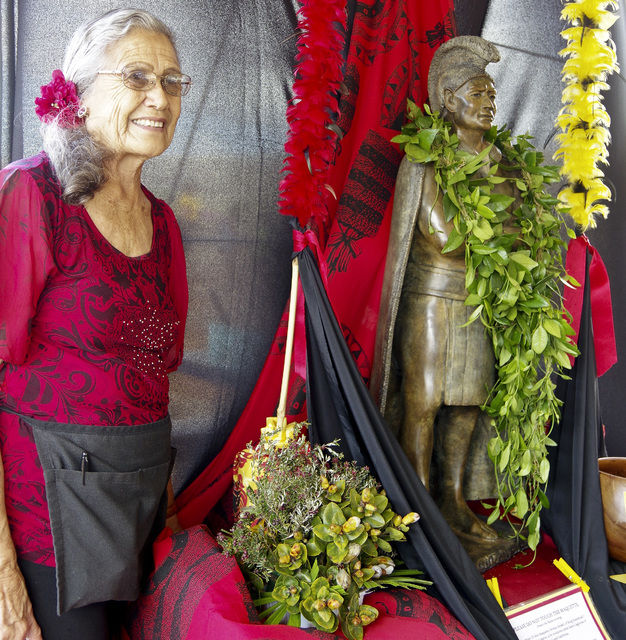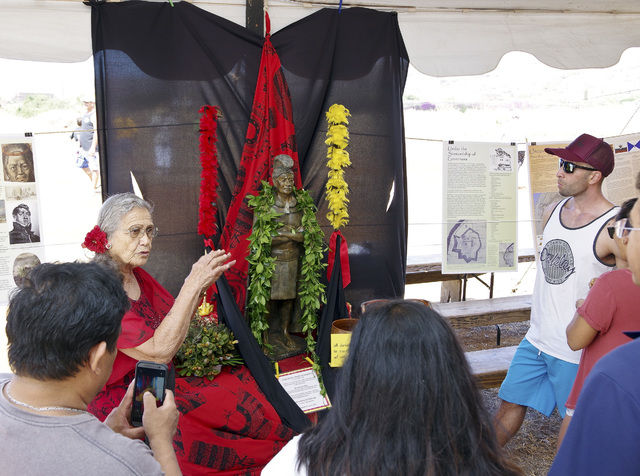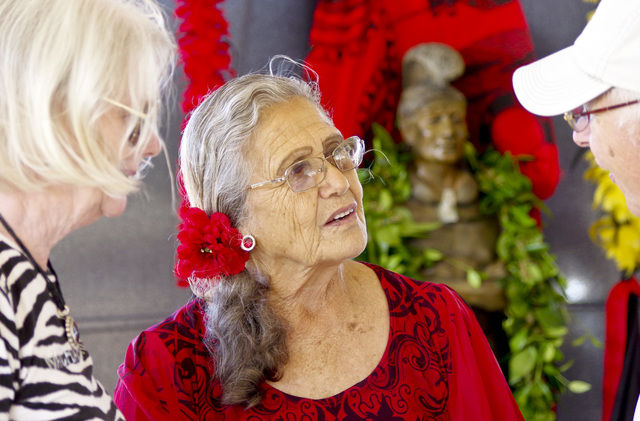Talk Story: Aletha Kaohi
WAIMEA — Kaumuali‘i looked out over the ocean and saw the foreign vessels with cannon power and warriors with guns.
Aletha Kaohi, manager of the West Kauai Visitor Center, talks of this saga and many more that depict the history of Waimea and its environs from its beginning as sugar and rice producing areas.
Her exhibits at the Visitor Center mirror the Hawaiian culture and practices of Kauai’s native ancestors as well as the region’s ethnic diversity and the technological resources fostered by the presence of the Pacific Missile Range Facility at Mana.
The rich history of the area is embellished with the use of Hawaiian artifacts that are part of the William Goodwin Collection as well as relics, appliances and articles gifted by individuals, families and organizations.
Who was Kaumuali‘i, and what is his significance to Kauai?
Kaumuali‘i was the last independent king of Kauai and Niihau.
Kaumuali‘i was born either in 1778 or 1780. British Sea Captain George Vancouver reported seeing a very young Kaumuali‘i in 1778 when he landed on Kauai as a junior officer under Capt. Cook; the Rev. Hiram Bingham placed Kaumuali‘i’s birth as 1780 based on native information; University of Hawaii Professor R.S. Kuykendall says probably 1780, but also seems to allow 1778 as possible.
The difference notwithstanding, the future King of Kauai was born at Holoholoku Heiau in Wailua, a birthplace favored among chiefs as it was thought to be a site which conferred the highest lineage. His food was prepared at Ka Lae o ka Manu Heiau where, close by and more than 175 years later, the Coco Palms Resort would be built.
He was born to Kamakahelei (wahine), Ali’i Aimoku of Kauai and Niihau and Kaeokulani (kane), known as Kaeo, Regent of Kauai and Niihau and brother to King Kahekili of Maui. In 1779, Kamakahelei placed her son, Chief Keawe, a youngster and half brother to Kaumuali‘i, on the throne.
In 1794, King Kahekili, by then ruler of all the islands except Hawaii, died and his dominions were divided between his son Kalanikupuli and his brother Kaeo. The two heirs soon disagreed and Kaeo was killed in the battle that ensued. Coincidentally, Kamakahelei died the same year (1794). Kamakahelei’s titles passed to Kaumuali‘i and he became Ali‘i Aimoku. However, he was too young to rule and Chief Inamoo served as regent.
In his first year as undisputed King of Kauai, Kaumuali‘i was faced with Kamehameha’s first attempt to invade Kauai. He was to face a second attempt in 1803. Both attempts failed before ever reaching Kauai’s shores.
Kauai was known for the religious character of its people and was called Kaua‘i Pule ‘O‘O (Kaua‘i of Strong Prayers); especially the powerful prayer of Ane‘e Kapuahi which was used frequently by Kaumuali‘i’s mother Kamakahelei. Many chiefs of other islands had tried to conquer Kauai in times past but had always been driven back.
In 1805, Kamehameha turned to acquiring Kauai by negotiation rather than warfare, sending emissaries to Kauai to invite Kaumuali‘i to meet on Oahu. All the while, Kamehameha continued to amass a force for invasion should negotiations fail.
Kamehameha waited a long time, finally sending Keawe-opu, Nahili and Isaac Davis, his faithful and respected adviser. Kaumuali‘i sent his nephew Kamaholelani, his wife Namahana, and high chiefs Haupu and Kumumu to negotiate with Kamehameha.
They were received with great honor and on receiving a report of their treatment, Kaumuali‘i consented to visit Oahu in person. In the meantime, Kaumuali’i had learned of Kamehameha’s military preparations, which included foreign vessels with cannon power, and warriors with guns.
Realizing he could not defend against such forces and to spare his people the horrors of a war he could not win, Kaumuali‘i decided to cede the islands of Kauai and Niihau to Kamehameha. Thus in April 1810, aboard American trader Capt. Nathan Winship’s ship the O’Cain, the two leaders made a pact whereby Kauai would become a tributary kingdom over which Kaumuali‘i would continue to govern, returning a nominal tribute as a sign of suzerainty.
Kaumuali‘i’s love for his people must rank as the most significant aspect of his life. He sacrificed his kingdom in ceding dominion over Kauai and Niihau to save his people from the horrors of warfare. They were endeared to him because of that love.
His ready and early acceptance of Christianity is another significant attribute, closely followed by his willingness to accept change, to recognize opportunities for growth, and his integrity. He was a man of his word and honored all of his commitments.
“We have already rid ourselves of one religion (the abolishment of the ancient kapu system in October 1819), I am not sure we are quite ready for another,” said Liholiho, as Kamehameha II, who was in residence at Kailua, Kona when the first company of missionaries from Boston arrived on April 4, 1820. He received them with caution.
Accompanying the first company of missionaries were four Hawaiian youths, one of whom was the “long lost” son of Kaumuali‘i. After reaching Honolulu, missionaries Samuel Ruggles and Samuel Whitney escorted “Prince Humehume” home to Kauai.
Kaumuali‘i was overjoyed at having his son once again and received the missionaries with a warm welcome and encouraged them to return to Kauai with their families, promising to assist them in establishing their mission in Waimea, offering to give them lands and build them dwelling houses, schools and churches. He promised to have the people observe the Sabbath, pray, and do whatever the missionaries required.
Humehume had been sent, as a young lad, to America in the care of a ship’s captain, to be educated. Unfortunately, the captain died shortly after returning home and the funds entrusted for Humehume’s care and education were swallowed up in the captain’s estate. Humehume was placed with a third party and lived in servitude without education. He ran from that situation to survive on his own, even serving aboard an American warship in the War of 1812.
The missionaries Whitney and Ruggles returned with their families in July 1820. They had public worship on a Sunday, attended by the king and queen and their retinue, after which he expressed his approval — “I like your worship very much. My old way was pupuka (ugly). I will come.”
How are you related to Kaumuali‘i?
Aletha was born in Waimea, Kauai, on the night of Mohalu, 1930, the seventh child of Margaret Kamala Kama‘i and William Kapahukaniolonookainoahou Goodwin, widely known as Willie Kani. He had delivered all six of his children and was preparing to do so for the expected seventh.
Margaret, confined to her bed, was anxious to hanau, while Willie Kani was hoping to delay birth until the Summer Solstice, June 21. It was only June 19 as he looked into a calabash of water and prayed to his Hulu Kupuna for a child endowed with cleverness, wisdom, knowledge and super-natural powers. But his wish for a solstice birth was not to be, as Aletha arrived at 11 p.m. on June 19, 25 hours short of the Summer Solstice.
A lifelong resident of Waimea, Aletha graduated from the Kamehameha School for Girls, and attended the University of Hawaii. She served as a public librarian at the Hanapepe and Waimea branches until retirement. She is a former lecturer in Hawaiian culture at the Kauai Community College, and is a state cultural resource consultant.
(See Genealogical Chant.)
What can be done to raise awareness of Kaumuali‘i and getting young people interested?
Kaumuali‘i, the last king of Kauai and Niihau, already has an elementary school named in his honor. The highway from Lihue to its end at Polihale bears his name, and Chiefess Kamakahelei Middle School is named in honor of his mother.
There is an effort to erect a statue symbolizing peace and aloha in honor of King Kaumuali‘i, the initial efforts starting in 2003. However, it could not be sustained, and interest dwindled.
The effort was revived in 2012 under new leadership. First in the effort was to create an awareness of King Kaumuali‘i — who he was, and what he did for Kauai.
Mayor Bernard Carvalho issued a proclamation in 2013, declaring the Year of the King. Residents of the Kauai Hindu Monastery in Wailua produced, as a gift, posters of King Kaumuali‘i, a likeness composed by native artist Brooke Parker. Kauai Area Complex Superintendent William Arakaki had posters distributed to every classroom of public and private schools on Kauai, and public school teachers were encouraged to include information about King Kaumuali‘i in their curriculum. A timeline of the king’s life was furnished to assist in that effort.
Renowned artist Saim Caglayan, with a gallery in Hanapepe and another in California, agreed to create a statue of King Kamuali‘i, and a capital campaign to raise $300,000 has started. A maquette of King Kaumuali‘i, a 3-foot-tall preliminary model for the final 7-foot-tall statue has been produced by Caglayan and is on display at the West Kauai Visitor Center.
How do you feel about being descended from royalty?
Aletha attends the Hanapepe Hawaiian Congregational Church and served on the original board of the Pu‘a Foundation founded by the Hawaii Conference United Church of Christ.
With E. Kalani Flores, she conducted the first comprehensive cultural and historic survey of Mana, Kauai. She co-authored a paper “Kahu: Its Origin and Use” and the book “Celebrating Advocacy: Past, Present and Future.” She writes grant proposals, assists others seeking funding, conducts workshops and blessings. A consummate community advocate, who frequently is called upon to assist in “things Hawaiian” on a host of subjects.
She has received numerous awards for her work in the community and in the preservation of Hawaiian culture. She gives credit to all who mentored her, especially her father, her late husband Mervin Kaohi, James Luka Nakapa‘ahu, Gabriel I, and Sarah Kailikea. Through her father, she came to understand the essence of being Hawaiian that allowed her to bridge her Hawaiian traditions and her Christian faith.
From all that she has accomplished, virtually all centered on serving people and her community, there is good reason to say that her father’s wish for a child endowed with knowledge, wisdom, cleverness and supernatural powers was granted.




